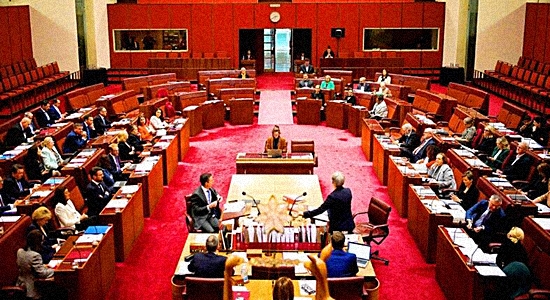
Is Australia more on Taiwan’s side, or the ROC’s side, than it used to be?
Tommy Lin, “chairman of the Formosa Republican Association and director of the Taiwan United Nations Alliance,” is optimistic about apparent changes in Australia’s policies toward the People’s Republic of China and the Republic of China.
One sign of the change is a proposal by “lawmakers from two Australian political parties” that the Australian parliament “pass a motion clarifying that UN Resolution 2758 concerns only China’s representation at the UN and has nothing to do with Taiwan. That is to say, Taiwan belongs to Taiwan, and China belongs to China. There is one country on one side of the Taiwan Strait and another country on the other” (“Australia clarifies UN resolution,” Taipei Times, September 2, 2024).
Lin’s report is ambiguous. Was the motion merely proposed, or did it also, as the headline implies, pass?
Unanimous
Passage by the Australian Senate is confirmed by a Taipei Times report of August 23: “Senators agreed by vote to move the motion ‘that United Nations Resolution 2758 of 25th October 1971 does not establish the People’s Republic of China’s [PRC] sovereignty over Taiwan and does not determine the future status of Taiwan in the United Nations, nor Taiwanese participation in UN agencies or international organizations.’ ”
The vote was unanimous.
Addressing Parliament House in Canberra, [Senator David Fawcett, a cosponsor] said that the motion was “urgent” because of the “growing risk to the security and stability in the Indo-Pacific” region.
“It’s important not just for the human rights of the 23.5 million people in the democracy that is Taiwan, but for the impact that a decrease in security and a conflict there would have on the rules-based order that underpins peace and security around the world, as well as for the global economic impact, which Australia would not escape,” Fawcett said.
[Cosponsor Deborah O’Neill] followed Fawcett’s remarks by saying that “the resolution [2758] does not mention Taiwan or address its political status.”
“Despite this fact, there is an ongoing and egregious campaign currently underway from the PRC to reinterpret the resolution and misrepresent what the resolution actually does,” she said, referring to China’s attempts to minimize Taiwan’s participation in the international community.
O’Neill said it was “not in the interest of the international community to have 24 million Taiwanese excluded” from critical bodies such as the International Civil Aviation Organization and the WHO.
Glossed over in the legislative discussion, in other respects somewhat encouraging, is the fact that United Nations Resolution 2758 was a massive blow to the Republic of China and served only to encourage the belligerence of the People’s Republic of China toward the ROC. This 1971 UN resolution states that the General Assembly:
Considering that the restoration of the lawful rights of the People’s Republic of China is essential both for the protection of the Charter of the United Nations and for the cause that the United Nations must serve under the Charter,
Recognizing that the representatives of the Government of the People’s Republic of China are the only lawful representatives of China to the United Nations and that the People’s Republic of China is one of the five permanent members of the Security Council,
Decides to restore all its rights to the People’s Republic of China and to recognize the representatives of its Government as the only legitimate representatives of China to the United Nations, and to expel forthwith the representatives of Chiang Kai-shek from the place which they unlawfully occupy at the United Nations and in all the organizations related to it.
It would have been better if the Australian Senate had renounced and repudiated UN Resolution 2758 instead of contending only that the PRC has woefully misrepresented it.
Unmentioned
Senator O’Neill says that 2758 “does not mention Taiwan or address its political status.” True. It doesn’t explicitly mention Taiwan and it doesn’t explicitly mention the formal name of the country, the Republic of China.
But isn’t the mention of “the representatives of Chiang Kai-shek” a way of mentioning—indirectly and dishonestly, but mentioning—the country? The United Nations doesn’t normally seat representatives of this guy and that guy. Countries are what the UN representatives are representing. The drafters of 2758 and those who said Yes to it were pretending that the UN had somehow gotten conned about the ROC’s country status and were now going to repair the effects of this terrible crime. What actually happened, of course, was a shift in the political winds.
The Australia now recognizing the threat of the People’s Republic of China and the inadvisability of assisting its hegemonic ambitions is the same Australia that, Tommy Lin notes, has exported “massive amounts of coal and iron ore” to China.
“These shipments caused Australia’s economy to become overly reliant on China. However, Australia is no longer asleep at the wheel. Not only has it realized China’s real-estate and infrastructure bubbles are bursting, but it also recognizes that Beijing is a menacing force against human rights and democratic liberties and freedoms.”
Australia is also “serving as a logistical rear base for the US to keep China in check in the Pacific” and working with the US and the UK “to enhance defense and technology cooperation.”
If all this is so, good.
However…
Jade Guan and Michael Clarke, writing for The Diplomat, regard the Australian Senate motion as “puzzling…given the recent efforts to stabilize relations with China.”
The authors also say: “While this move aligns with broader democratic principles, it does not mean a shift in Australia’s One China policy. Australia does not recognize Taiwan as a country but maintains unofficial contacts with Taiwan promoting economic, trade and cultural interests.”
Well, it’s a country; or rather, as James Roth reminds us, the Republic of China, of which Taiwan is the biggest part, is a country. To avoid puzzling Guan and Clarke for very long, perhaps the Australian government could formally acknowledge this.





